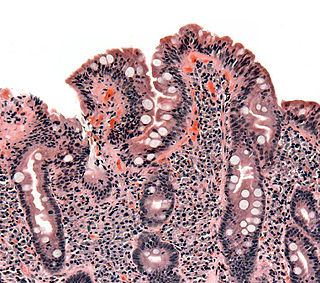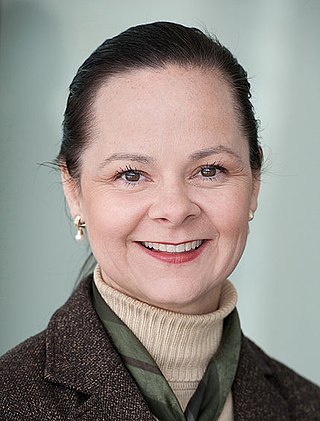Related Research Articles

Diarrhea, also spelled diarrhoea or diarrhœa, is the condition of having at least three loose, liquid, or watery bowel movements each day. It often lasts for a few days and can result in dehydration due to fluid loss. Signs of dehydration often begin with loss of the normal stretchiness of the skin and irritable behaviour. This can progress to decreased urination, loss of skin color, a fast heart rate, and a decrease in responsiveness as it becomes more severe. Loose but non-watery stools in babies who are exclusively breastfed, however, are normal.

Coeliac disease or celiac disease is a long-term autoimmune disorder, primarily affecting the small intestine, where individuals develop intolerance to gluten, present in foods such as wheat, rye and barley. Classic symptoms include gastrointestinal problems such as chronic diarrhoea, abdominal distention, malabsorption, loss of appetite, and among children failure to grow normally. This often begins between six months and two years of age. Non-classic symptoms are more common, especially in people older than two years. There may be mild or absent gastrointestinal symptoms, a wide number of symptoms involving any part of the body, or no obvious symptoms. Coeliac disease was first described in childhood; however, it may develop at any age. It is associated with other autoimmune diseases, such as Type 1 diabetes mellitus and Hashimoto's thyroiditis, among others.

A gluten-free diet (GFD) is a nutritional plan that strictly excludes gluten, which is a mixture of prolamin proteins found in wheat, as well as barley, rye, and oats. The inclusion of oats in a gluten-free diet remains controversial, and may depend on the oat cultivar and the frequent cross-contamination with other gluten-containing cereals.

Ischemic hepatitis, also known as shock liver, is a condition defined as an acute liver injury caused by insufficient blood flow to the liver. The decreased blood flow (perfusion) to the liver is usually due to shock or low blood pressure. However, local causes involving the hepatic artery that supplies oxygen to the liver, such as a blood clot in the hepatic artery, can also cause ischemic hepatitis.
Charlotte Morrison Anderson AM FRACP FRCP FACP FRCPCH was an internationally renowned Australian scientist, physician and academic. She pioneered the field of paediatric gastroenterology working on health issues including cystic fibrosis and coeliac disease. She was the first woman professor of paediatrics in the United Kingdom.
The Journal of Pediatric Gastroenterology and Nutrition is a monthly peer-reviewed medical journal covering research on digestive diseases and nutrition in children. It is published by Lippincott Williams & Wilkins and was established in 1982. It is an official journal of the European Society for Paediatric Gastroenterology, Hepatology and Nutrition and the North American Society for Pediatric Gastroenterology, Hepatology and Nutrition. The journal provides a forum for original papers and reviews dealing with pediatric gastroenterology and nutrition, including normal and abnormal functions of the alimentary tract and its associated organs, including the salivary glands, pancreas, gallbladder, and liver. Particular emphasis is on development and its relation to infant and childhood nutrition.
Chronic diarrheaof infancy, also called toddler's diarrhea, is a common condition typically affecting up to 1.7 billion children between ages 6–30 months worldwide every year, usually resolving by age 4. According to the World Health Organization (WHO), diarrheal disease is the second greatest cause of death in children 5 years and younger. Diarrheal disease takes the lives of 525,000 or more children per year. Diarrhea is characterized as the condition of passing of three or more loose or watery bowel movements within a day sometimes with undigested food visible. Diarrhea is separated into three clinical categories; acute diarrhea may last multiple hours or days, acute bloody diarrhea, also known as dysentery, and finally, chronic or persistent diarrhea which lasts 2–4 weeks or more. There is normal growth with no evidence of malnutrition in the child experiencing persistent diarrhea. In chronic diarrhea there is no evidence of blood in the stool and there is no sign of infection. The condition may be related to irritable bowel syndrome. There are various tests that can be performed to rule out other causes of diarrhea that don't fall under the chronic criteria, including blood test, colonoscopy, and even genetic testing. Most acute or severe cases of diarrhea have treatment guidelines revolving around prescription or non prescription medications based on the cause, but the treatment protocols for chronic diarrhea focus on replenishing the body with lost fluids and electrolytes, because there typically isn't a treatable cause.
Pediatric gastroenterology developed as a sub-specialty of pediatrics and gastroenterology. It is concerned with treating the gastrointestinal tract, liver and pancreas of children from infancy until age eighteen. The principal diseases it is concerned with are acute diarrhea, persistent vomiting, gastritis, and problems with the development of the gastric tract.

Alessio Fasano is an Italian-born medical doctor, pediatric gastroenterologist and researcher. He currently holds many roles, including professor of pediatrics at Harvard Medical School and professor of nutrition at Harvard T.H. Chan School of Public Health, both in Boston. He serves as director of the Center for Celiac Research and Treatment at MassGeneral Hospital for Children (MGHfC) and co-director of the Harvard Medical School Celiac Research Program. In addition, he is director of the Mucosal Immunology and Biology Research Center at MGHfC, where he oversees a research program with approximately 50 scientists and staff researching a variety of acute and chronic inflammatory diseases, including cystic fibrosis, celiac disease, enteric infections and necrotizing enterocolitis. A common theme of these programs is the study of the emerging role of the gut microbiome in health and disease. Fasano is also the scientific director of the European Biomedical Research Institute of Salerno (EBRIS) in Italy. Along with these leadership positions, he is a practicing outpatient clinician in pediatric gastroenterology and nutrition and the division chief.

Yogesh Kumar Chawla is an Indian medical doctor, hepatologist and has served as the director of the Post Graduate Institute of Medical Education and Research (PGIMER), Chandigarh. He graduated in medicine from the Netaji Subhash Chandra Bose Medical College, Jabalpur, secured a master's degree (MD) in gastroenterology from the same college before joining PGIMER in 1983 as a member of faculty of the department of hepatology and became the head of the department in 1999. Chawla, a recipient of the 1999 Dr. B. C. Roy Award and an elected fellow of the National Academy of Medical Sciences was honoured by the Government of India in 2015 with Padma Shri, the fourth highest Indian civilian award.
Serum-derived bovine immunoglobulin/protein isolate (SBI) is a medical food product derived from bovine serum obtained from adult cows in the United States. It is sold under the name EnteraGam.
Badri Nath Tandon is an Indian gastroenterologist, hepatologist, medical researcher and academic, and the Chairman and Senior Consultant of Gastroenterology, at Metro Hospitals and Heart Institute, Noida. He is a former Professor and Head of Department of Gastroenterology and Human Nutrition Unit at the All India Institute of Medical Sciences, Delhi (AIIMS) and a former Director and Senior Consultant of Hepatology and Gastroenterology at Pushpawati Singhania Research Institute for Liver, Renal and Digestive Diseases, New Delhi. He is a recipient of several awards including Sasakawa WHO Health Prize and Jubilee Medal of the RAMS. The Government of India awarded him the third highest civilian honour of the Padma Bhushan, in 1986, for his contributions to medicine.
Shiv Kumar Sarin is an Indian gastroenterologist, hepatologist, translational scientist, researcher and teacher. He set up the Institute of Liver and Biliary Sciences. He is a recipient of the Shanti Swarup Bhatnagar Prize and the Padma Bhushan. He served as Chairman of the Board of Governors of Medical Council of India. He was the president of the Asian Pacific Association for the Study of the Liver and founder of Asian Pacific School of Hepatology.
Ibrahim Mohamed Fayad was an Egyptian senior pediatrician and a Professor of Pediatrics at Kasr Al Aini School of Medicine, Cairo University.
Subrat Kumar Panda is an Indian virologist, professor and Head Department of Pathology at All India Institute of Medical Sciences, Delhi. Known for his researches in viral hepatitis, Panda is an elected fellow of the Indian Academy of Sciences, Indian National Science Academy and the National Academy of Medical Sciences. The Council of Scientific and Industrial Research, the apex agency of the Government of India for scientific research, awarded him the Shanti Swarup Bhatnagar Prize for Science and Technology, one of the highest Indian science awards for his contributions to Medical Sciences in 1995.
Ravinder Goswami is an Indian endocrinologist and professor at the department of endocrinology and metabolism at the All India Institute of Medical Sciences, Delhi. Known for his research on vitamin D deficiency, Goswami is an elected fellow of National Academy of Sciences, India and Indian Academy of Sciences. The Council of Scientific and Industrial Research, the apex agency of the Government of India for scientific research, awarded him the Shanti Swarup Bhatnagar Prize for Science and Technology, one of the highest Indian science awards for his contributions to Medical Sciences in 2008.
AME Publishing Company is an academic publishing company, which publishes medical journals and books. Founded in July 2009, it is currently headquartered in Hong Kong, with additional offices in Guangzhou, Changsha, Nanjing, Shanghai, Chengdu, Beijing, Taipei, and Hangzhou. Its name stands for "Academic Made Easy/Excellent/Enthusiastic". It has published over 50 medical journals, as well as 20 English-language books, 28 Chinese-language books, and 60 e-books.

Wendy A. Henderson is an American nurse practitioner, scientist, and academic administrator working as the director of the Center of Nursing Scholarship and Innovation at the University of Connecticut. She was previously a clinical investigator and lab chief of the National Institute of Nursing Research digestive disorders unit. Henderson is a Fellow of the American Academy of Nursing.
Deirdre Kelly is an Irish clinician, academic, and author. She is Professor of Paediatric Hepatology at the University of Birmingham and Clinical Lead for National Paediatric Hepatitis C Operational Delivery Network. She chairs the Board of Pension Trustees at the General Medical Council and is a non-executive director at NHS Blood and Transplant.
References
- ↑ "Translational Health Science and Technology Institute". www.thsti.res.in. Retrieved 16 July 2016.
- ↑ "Indian scientists come up with quick cheap test for gluten intolerance". 29 October 2014.
- ↑ Bhatnagar, Shinjini; Wadhwa, Nitya; Aneja, Satinder; Lodha, Rakesh; Kabra, Sushil Kumar; Natchu, Uma Chandra Mouli; Sommerfelt, Halvor; Dutta, Ashok Kumar; Chandra, Jagdish; Rath, Bimbadhar; Sharma, Mamta; Sharma, Vinod Kumar; Kumari, Mohini; Strand, Tor A (2012). "Zinc as adjunct treatment in infants aged between 7 and 120 days with probable serious bacterial infection: A randomised, double-blind, placebo-controlled trial". The Lancet. 379 (9831): 2072–8. doi:10.1016/S0140-6736(12)60477-2. PMID 22656335. S2CID 11249740.
- ↑ "The National Academy of Sciences, India - Fellows". www.nasi.org.in. Retrieved 16 July 2016.